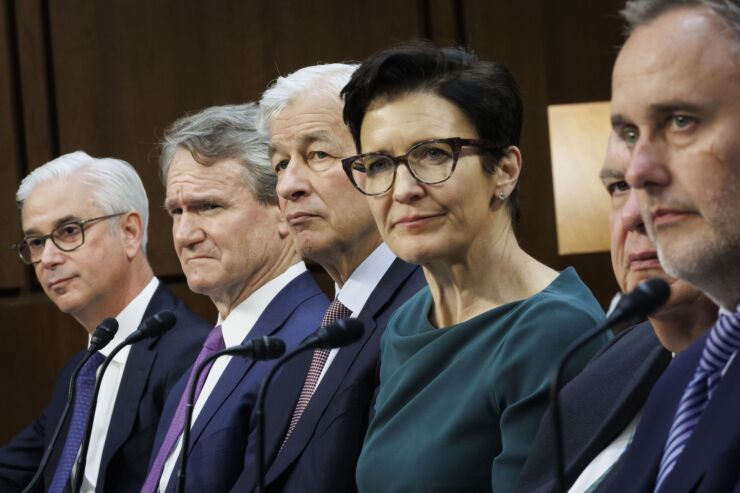
WASHINGTON — A panel of eight major bank CEOs used their testimony before the Senate Banking Committee Wednesday to criticize the proposed Basel III endgame capital rules, furthering the
Lawmakers largely eschewed the political flogging that normally accompanies the appearance of Wall Street executives, instead looking for endorsements of their various pieces of legislation. Even Sen. Elizabeth Warren, D-Mass., used her time to get the executives to agree with her that crypto companies should have the same anti-money-laundering requirements as banks.
The bank CEOs, meanwhile, used their time to reiterate points that have been made by banking interests in Washington about the Basel III endgame proposal. The large CEO panel included Jamie Dimon of JPMorgan, Charlie Scharf of Wells Fargo, Brian Moynihan of Bank of America, Jane Fraser of Citigroup, David Solomon of Goldman Sachs, James Gorman of Morgan Stanley, Ronald O'Hanley of State Street and Robin Vince of BNY Mellon.
"Despite zero evidence that large U.S. banks are undercapitalized today, the proposed Basel III endgame rule, if enacted, would unjustifiably and unnecessarily increase capital requirements by 20-25% for the largest banks," Dimon said. "Banks would be limited in their ability to deploy capital in the times we're most needed, and the rule will have a harmful ripple effect on the economy, markets, businesses of all sizes and American households."
The CEOs particularly complained that they haven't been looped into the process to give their feedback, and that the Basel proposal hasn't been properly studied.
"I fear that 'propose now, study later' has become a troublesome new theme in Washington," Dimon said.
The executives repeatedly brought up their role in mitigating the regional bank crisis earlier this year, arguing that they served as a source of strength for the financial system during that time. Because of that — and because Silicon Valley Bank's failure sparked runs on other large regional institutions — more stringent capital requirements aren't necessary, they said.
"It was not a banking crisis, it was a crisis of three banks," Gorman said.
With the exception of the panel's chairman, Sen. Sherrod Brown, D-Ohio, most Democratic members of the committee didn't push back too hard on the bank CEO's Basel III points.
"Let's be clear: Absolutely nothing in these rules would stop your banks from making loans to working families and small businesses," Brown said. "Absolutely nothing. The reason banks might make fewer of these good loans in the future is the same reason we've been seeing less and less productive banking activity for years: It doesn't make your banks as much money as the risky stuff. You would rather fund risky trading and derivatives bets than boring, bread-and-butter small-business lending."
Moderate Democrats may hold the fate of the Basel III proposal in their hands. While lawmakers don't officially have the power to block or rewrite the rule, their political pressure on Fed Chairman Jerome Powell to drop or significantly rewrite the proposal may gain purchase. Powell has said he wants the proposal to have "
Sen. Mark Warner, D-Va., a moderate Democrat who's supported tailoring rules for bank capital in the past, and has been sympathetic to banks' arguments about Basel III, said that he gets frustrated at the complaints about liquidity and access to capital when banks don't use existing tools, such as the Federal Reserve's discount window. He asked if there should be a mandatory discount window loan program to reduce the stigma.
"The most important liquidity tool was the discount window, yet we saw with the banks this year, particularly in terms of SVB and Signature , they didn't have procedures in place to know how to utilize that tool," Warner said. "We can't complain about new regulations if you aren't using existing tools."
Sen. Jon Tester, D-Mont., another moderate Democrat who could be sympathetic to banks' arguments about Basel III, asked Fraser to quantify how much money she worries will leave the banking system should banks have those higher capital requirements. Fraser said that a migration would happen, but didn't specify a scale on which capital could leave the banking system.
"We are worried about migration of financial activities into the nonbanking sector, particularly in a period where there's tremendous technological innovation," Fraser said. "Making sure that we maintain the safeguards that we all invest billions of dollars in anti-money-laundering, fraud protection, cyber protection. All of these areas protect the American consumer, the American saver and safeguard the system and also the critical role that all of our banks play in the global financial system as a strategic asset for us. So we are very concerned that this will undermine some of the strengths and foundations of the unique American financial system."






